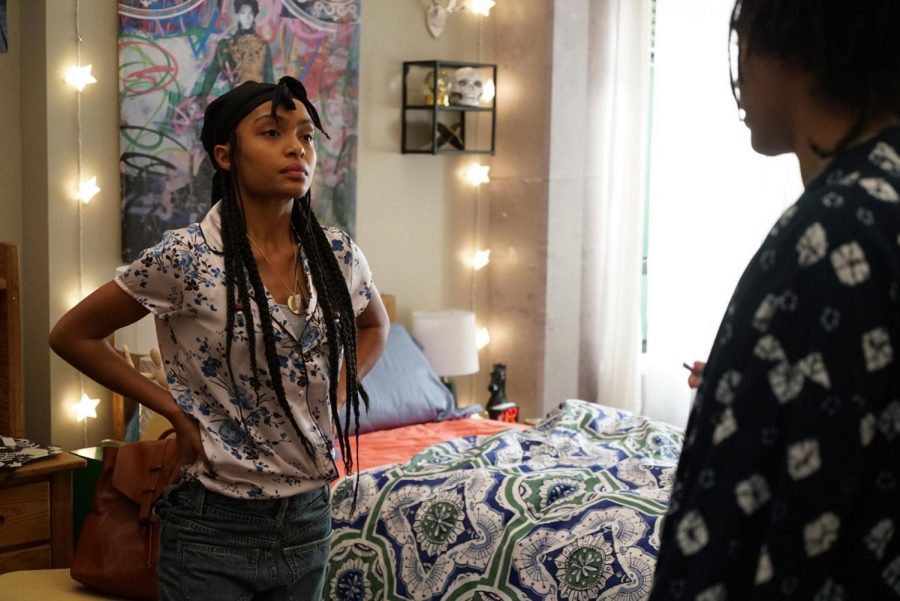‘Grown-ish’ is the accurate college show for everyone
Tribune News Service
Yara Shahidi and Luka Sabbat in an episode of Freeform’s series, “Grown-ish.” (Eric Liebowitz/Freeform)
Editor’s Note: Veronica Wernicke is a freshman at UNCW majoring in Communication Studies and is the Assistant Opinion Editor for The Seahawk. The opinions expressed in this article are solely those of the author. Veronica Wernicke may be found on Twitter @itsveronica98. All suggestions and inquiries may be sent via email to [email protected].
In middle school I looked to popular high school dramas like “Gossip Girl” to see what high school would be like. Then in high school I continued watching high school-based shows like “One Tree Hill”, “Riverdale” and “Awkward”. I always loved watching these shows — despite their over the top dramatic elements. Even though they were highly popular and entertaining to watch, they just did not depict the life of an average high schooler, which is disappointing.
I assumed the same for college-based shows. However, Freeform’s “Grown-ish” breaks away from this stereotype. A spin-off of ABC’s award-winning comedy “Black-ish”, “Grown-ish” follows college newbie Zoey Johnson — along with her friends — growing and navigating her new life at Cal U.
Until recently a lot of high school and college-based shows featured a cast of all white characters. While in high school that might have been easier to let slip by, in college it is not accurate or acceptable. In college you meet so many new people who come from all walks of life.
“Grown-ish” follows Zoey Johnson, a female African American; Aaron, a male African American activist; Ana, a female Republican Cuban-American; Nomi, a white bi-female; Vivek, a male Indian drug dealer; Luca, a male African American fashion designer and female African American twins and athletes Jazz and Sky. College is all about meeting and seeing a lot of new people who come from diverse backgrounds. This show is catching up with the times by featuring a more diverse cast which again is an honest picture of college.
Much like “Black-ish”, “Grown-ish” tackles and discuss current issues in our country. This is one of the things that drew me to watch “Black-ish” and later on “Grown-ish”. These are not just comedy sitcoms, they are shows that discuss important topics and give you the facts as they relate. For instance, in a “Black-ish” episode about the family celebrating “Juneteenth” the show throws in statistics and facts about slavery as it relates to the episode.
In its first season, “Grown-ish” already has accurate episodes about sex, relationships, drugs, politics, the balance of school and fun, the power of social media and many other important college-related topics. In a recent “Grown-ish” episode they tackle the topic of safe spaces and feature a campus protest, which is all but too relevant in our current times.
Most shows and movies that revolve around college portray a scene of non-stop partying. The high life of college if you will. While they do show partying in “Grown-ish” we see that it is not all partying and sometimes you do not feel like you fit in. At one of Johnson’s first parties she is put on cup duty and thus referred to as “cup girl.” Then when she gets into an inclusive club with Luka, she starts to feel out of place and uncomfortable, despite her initial need to want to be there.
Not all college parties are like “Animal House” and sometimes despite how much you wanted to be there and how cool you thought it would be, some parties just are not cool. We all have this crazy idea of college parties and my first party was nothing like it. It was kind of weird and uncomfortable. In that episode I was able to relate to Johnson’s uncomfortableness and that is what I love about this series. It is relatable.
This series not only discusses relevant issues, but they show how important it is to have a voice and just how important it is for younger people to have a voice. Throughout the series Johnson speaks to the camera or we hear her voice over. All the characters on “Grown-ish” come from different backgrounds and almost every episode viewers are able to hear all their different perspectives on the issues addressed. Sometimes it’s civil and other times it is a little less civil, but again that is real life.
We get to see these characters weaknesses, insecurities and what makes them thrive. Most importantly these elements are not over the top like many other teen dramas.
It is 2018 and we all deserve an equal voice and we need more role models like Johnson’s character saying that you need to use your voice.
Another great aspect of “Grown-ish” is it also lends to more and better conversations between college students and their parents. In the series, Johnson calls one her parents almost every other episode to discuss a problem or catch up. Despite our newfound freedom in college, at one point we have all missed talking or seeing our parents on a regular basis.
“Grown-ish” shows that this is completely normal, and we do not know everything — despite our belief — and we still need to consult our parents. “Grown-ish” has opened the doors for viewers to talk more openly with their parents about things going on during college, whether it be relationships or classes.
Unlike many of its counterparts, “Grown-ish” provides an accurate depiction of college life for the average student. This is so refreshing to watch, and I applaud Freeform for their excellent work. It is great to finally see a show like “Grown-ish” that surpasses expectations of college-based shows and informs its viewers about relevant issues in our day to day lives.







